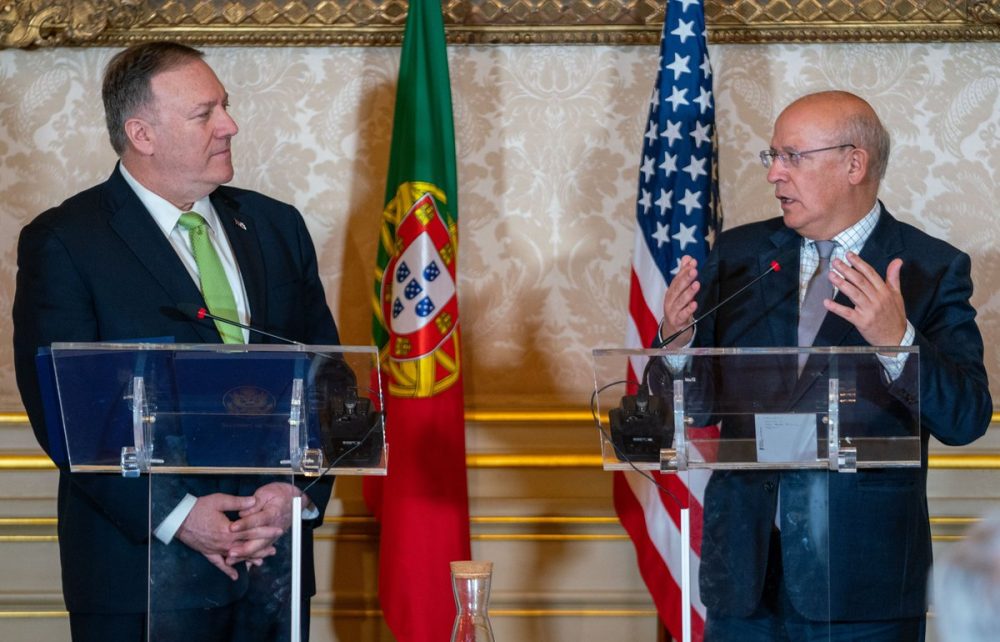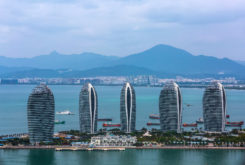Portugal is the latest in a string of countries that the US has pushed to not partner with Chinese tech company Huawei for next-generation 5G networks. This month, the pressure escalated, with US Secretary of State Mike Pompeo bringing up the matter in a visit Lisbon. But Portugal, a NATO ally, refuses to put Huawei offside.
Pompeo made efforts to persuade Portuguese authorities to prevent the tech giant from providing hardware that operates the new ultra-fast 5G networks, warning that the Chinese government “won’t hesitate” to use Huawei as a tool to access sensitive data.
“We have tried for these past couple of years to make clear to our friends all around the world of the attendant risks,” Pompeo said, speaking at a press conference following a bilateral meeting with his Portuguese counterpart in Lisbon on 5 December.
But Portuguese Foreign Minister Augusto Santos Silva refused to exclude China from supplying technology for the country’s next-generation 5G wireless network.
Santos Silva stated that any bids from 5G Chinese operators “will be assessed in the light of strict Portuguese and EU regulations,” and that “each country will make its own decisions about such matters.”
The allegations by the US that Huawei 5G may compromise cybersecurity by facilitating Chinese government cyber-espionage have been denied by both Huawei and Beijing.
While the US praised Poland for the arrests, the presence of Huawei in the country illustrates the limits of Washington’s success in pressuring its European allies. Even the UK, America’s closest ally in Europe and member of the Five Eyes security alliance, has Huawei in its networks and will be welcoming a new Huawei R&D factory in 2021.
In Portugal, Huawei is already involved in installing the 5G mobile phone network, having recently covered the northern city of Matosinhos with the new technology, in a partnership with Portuguese telecommunications company NOS.
Wireless carrier MEO, owned by Altice Portugal, has already partnered with Huawei, preparing to launch 5G services in Portugal in 2020.
On 3 December, the day before Pompeo’s two-day visit to Lisbon, the EU Council identified serious risks posed to 5G telecommunications networks if they are built using untrusted vendors. This comes a year after the EU’s technology chief, European Commissioner for the Digital Single Market Andrus Ansip, expressed concern about Huawei’s expansion in Europe, arguing Chinese technology companies may be forced to provide information to China’s secret services.
Officials in Norway and the UK have expressed their own concerns about potential vulnerabilities in their 5G networks, both of which rely heavily on Huawei. The EU will publish a “5G risk mitigation toolbox” later this month.
The US State Department applauded the EU’s position, and stated that because “5G networks will form the backbone of future economies and critical infrastructure,” the “stakes are too high to allow these vital networks to be provided and serviced by vendors open to manipulation by authoritarian regimes.”
“Chinese telecommunications firms such as Huawei and ZTE must comply with the directives of the government of the People’s Republic of China,” the press statement went on, “without any meaningful checks and balances that would prevent misuse of data. Allowing these vendors anywhere in a country’s 5G networks would present critical risks to the privacy, human rights, and security of its citizens.”
A recently released paper from the US State Department, entitled “Huawei: Myth vs Fact” accuses the company of “aggressively spreading misleading and false information about its technical capabilities, ownership, and legal obligations to China and the Chinese Communist Party.” It further asserts that Huawei “cannot be trusted to tell the truth or protect the interests of others, and it should not be trusted with the vital security of 5G networks.”
In dispelling the “myths” around Huawei, the US State Department hopes to undermine both the company’s selling points to customers and business partners, and its arguments against the US efforts to exclude Huawei.
The US Embassy in Portugal has been actively lobbying against Huawei, and earlier this year, invited a small group of journalists to a conference with the chairman of the Federal Communications Commission, Ajit Pai, at the end of his visit to Portugal. The US ambassador to the country, George E Glass, went further saying that while Portugal is one of America’s closest allies, namely in NATO, ties with China in telecom network development make sharing critical information through networks unsafe, therefore affecting relations with Portugal.
The matter was quickly picked up by the main opposition party, PSD, whose vice president, Rubina Berardo, has demanded to see the agreement between MEO and Huawei for the development of 5G technology. The agreement was signed at the end of 2018, during the visit to Portugal by Chinese President Xi Jinping.
According to our sources, US concerns had been expressed to the Portuguese authorities behind the curtains, but the government’s lack of response prompted the embassy to go public.
The Portuguese government maintains a position against European protectionism against countries such as China. In an interview with the Financial Times on Sunday, earlier this year, Prime Minister Antonio Costa said that while Portugal shares the concerns over potential risks, “it is very important not to stop the modernisation of Europe’s digital infrastructure” and that Europe needs to invest more in education and research and increase cooperation among member states, “instead of closing borders to innovation from abroad.”




